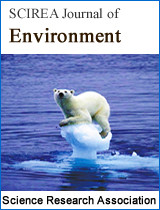Emerging pollutants and heavy metals into Spanish sanitation: a case study
DOI: 354 Downloads 15984 Views
Author(s)
Abstract
Emerging pollutants in urban waste water has increased significantly their levels over the last 15 years having both industrial origin and domestic one. Once these contaminants reach to an urban WWTP, in most cases operated by aerobic biological process, the treatment capacity of these effluents therein suffers greatly. Thus, we have studied the presence of several emerging pollutants and metals in urban waste water from Córdoba (Spain) along 2005-2015; moreover, it has also tested the practical ability of reducing the content of these substances in La Golondrina´s WWTP. The compounds studied were: pesticides, VOCs, THM´s, PAH´s, AOX´s and heavy metals. La Golondrina´s WWTP processed during 2.005-2.015 a mean flow of 25.6 hm3/year: this plant is operated by activated sludge process. Results indicated that the wastewater influent presented 740 g/day of organics which were reduced to 387 g/day in the treated water, with reduction rates depending on compound and ranged from <5% and 83.8%. Almost, wastewater influent presented 92.4 kg/day of heavy metals which were reduced to 35.8 kg/day in the treated water: then, reduction rates depending on metal ranging from -16.7% and 68.9%. Finally, these results are not very different of those obtained in the rest of Spain.
Keywords
Keywords: Wastewater, WWTP, activated sludge, emerging pollutants, heavy metals.
Cite this paper
Rafael Marín Galvín, José Miguel Rodríguez Mellado,
Emerging pollutants and heavy metals into Spanish sanitation: a case study
, SCIREA Journal of Environment.
Volume 2, Issue 1, February 2017 | PP. 1-10.
References
| [ 1 ] | EU (2009) Source Control Options for Reducing Emissions of Priority Pollutants (ScorePP) Sixth Framework Programme, Sub-Priority 1.1.6.3, Global Change and Ecosystems Project no. 037036, www.scorepp.eu, Duration: 1 October 2006 – 30 September 2009 (and ref. therein cited). |
| [ 2 ] | Mantecón Pascual, R. (2012). Manual Técnico de Inspección and Anexes (and ref. therein cited). Ed. by autor. Barcelona. 197 pp. |
| [ 3 ] | Marín Galvín R, Ripollés Pascual, F, Santateresa Forcada, E, Lahora Cano, A, González Canal, I, Mantecón Pascual, R. & Rodríguez Amaro, R. (2009) Contaminación convencional, sustancias prioritarias y contaminantes emergentes en saneamientos públicos españoles. Tecnología del Agua, 313, 40-54. |
| [ 4 ] | Marín Galvín, R. (2014) Control de calidad en las aguas residuales y regeneradas: parámetros a controlar en función de las normativas aplicables y nuevas tendencias. Tecnoagua, 5, 50-63. |
| [ 5 ] | Marín Galvín, R. and González Jiménez, M.M. (2016) Dinámica de algunos contaminantes orgánicos emergentes en una EDAR convencional operada por fangos activos. Aguasresiduales.info, enero, 1-7. |
| [ 6 ] | Metcalf and Eddy INC. (2003). Wastewater Engineering Treatment and Reuse (4th ed.) (and ref. therein cited). Ed. McGraw Hill, New York. 1819 pp. |
| [ 7 ] | Musolff, A., Leshchik, S., Möder, M., Strauch ,G., Reinsforf, F. & Schirmer, M (2009). Temporal and spatial patterns of micropollutants in urban receiving waters. Environ Pollut. 157 3069–3077. |
| [ 8 ] | Novotny, V. (2003). Water Quality. Diffusion Pollution and watershed management (2nd ed.) (and ref. therein cited). Wiley & Sons, Inc. New York. 864 pp. |
| [ 9 ] | Petrović, M., González, S. & Barceló, D. (2003). Analysis and removal of emerging contaminants in wastewater and drinking water. Trends in Analytical Chemistry. 22 (10) 685-696. |
| [ 10 ] | Reemtsma, T., Weiss, S., Mueller, J., Petrovic, M., González, S., Barceló, D., Ventura, F. & Knepper, T. (2006) Polar pollutants entry into the water cycle by municipal wastewater: a European perspective. Environ. Sci. Technol., 40, 5451-5458. |
| [ 11 ] | Simón Andreu, P.J., Lardín Mifsut, C., González Herrero, R., Sánchez Beltrán, A. V. & Vicente González, J.A. (2015) Estudio de la presencia de contaminantes emergentes en las distintas etapas de las depuradoras. RETEMA, 186, 84-91. |
| [ 12 ] | Teijón, G., Candela, I., Tamoh, K., Molina-Díaz, A. & Fernández-Alba, R. (2010) Occurrence of emerging contaminants, priority substances (2008/105/CE) and hevay metals in treated wastewater and groundwater at Depurbaix facility (Barcelona, Spain). Sci. of Total Environm, 408 (17) 3584-3595. |

